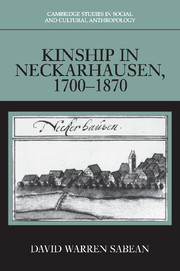Book contents
- Frontmatter
- Contents
- List of tables
- Abbreviations
- Abbreviations of sources
- On reading kinship diagrams
- Glossary
- Preface
- Introduction
- Cohort I (1700–1709)
- 4 Introduction to kinship during the early decades of the eighteenth century
- 5 Kinship as a factor in marriage strategy
- 6 Marriage and kinship practices
- 7 Ritual kinship
- 8 Naming children
- Cohort II (1740–1749)
- Cohort III (1780–1789)
- Cohort IV (1820–1829)
- Cohort V (1860–1869)
- Conclusion
- Appendix
- Bibliography
- General index
- Index of villagers
8 - Naming children
Published online by Cambridge University Press: 04 August 2010
- Frontmatter
- Contents
- List of tables
- Abbreviations
- Abbreviations of sources
- On reading kinship diagrams
- Glossary
- Preface
- Introduction
- Cohort I (1700–1709)
- 4 Introduction to kinship during the early decades of the eighteenth century
- 5 Kinship as a factor in marriage strategy
- 6 Marriage and kinship practices
- 7 Ritual kinship
- 8 Naming children
- Cohort II (1740–1749)
- Cohort III (1780–1789)
- Cohort IV (1820–1829)
- Cohort V (1860–1869)
- Conclusion
- Appendix
- Bibliography
- General index
- Index of villagers
Summary
The structure of alliance in Neckarhausen in the early decades of the seventeenth century gave privileged place to affinal kin and to networks of villagers created and maintained for the most part by people on the same generational plane. Most godparents, even though they were older than the parents they were connected with, were still not from a generation above them. They were the active, powerful members of the village. It is true that the oldest siblings often fit themselves into a field of relations constructed by their elders and sometimes chose their godparents from their parents' cohort. But as the new generation developed and modified the configurations of power and wealth, its members chose ritual kin corresponding to those new realities. And younger siblings marrying for the first time and older ones remarrying constructed alliances that linked together existing households and active adults of the village. They did not reproduce older alliances by marrying consanguineal relatives, which would have been a way of inscribing past relationships onto present ones. Traditional alliances were not replicated by new marriages every second or third generation. Although marriage alliance did not provide continuity across generations, sometimes godparentage did, although here again the matter seems to have been tied less to the maintenance of a family tradition than to assembling new power configurations out of the bits and pieces of earlier ones.
- Type
- Chapter
- Information
- Kinship in Neckarhausen, 1700–1870 , pp. 159 - 168Publisher: Cambridge University PressPrint publication year: 1997



